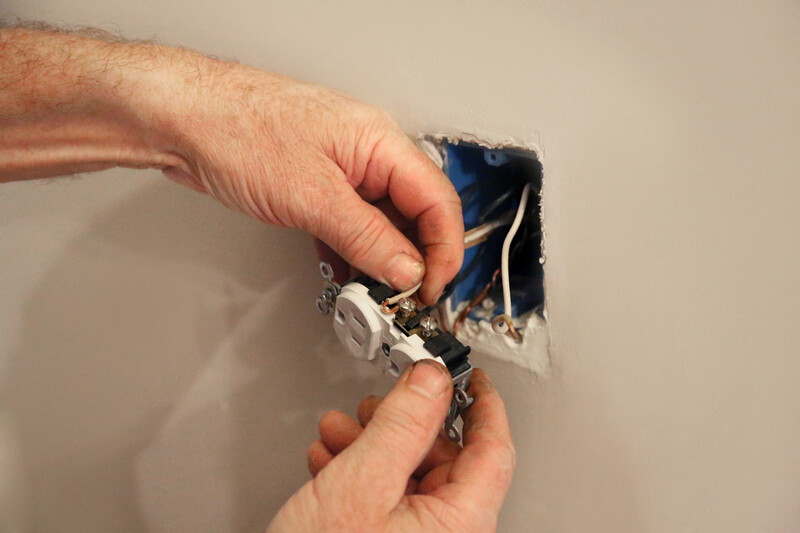- AppliancesElectriciansHVACLandscapingLocksmithPest ControlPlumbingRenovationRoofingT V RepairAll Home Improvement
- Car AccidentClass ActionCorporate LawCriminal DefenseDivorce LawEmployment LawFamily LawFinancial LawLegal AidMedical Injury LawyersMedical MalpracticeReal Estate LawWater Fire RestorationAll Legal
- InvestmentRetirementAll Finance
- Animal InsuranceAutoGeneral InsuranceHealth PolicyHome RentersAll Insurance
- DentalHealth SpecialistsAll Medical
- Animal CareVeterinaryAll Pets
- Auto GlassTowingAll Automotive
Can One Bad Outlet Affect Others?

Electrical systems are a mystery to many homeowners, and it can be a bit baffling when outlets don’t work as you’d expect them to. To further complicate matters, what if one outlet is bad and seems to be affecting others?
Read More Home Improvement Articles
If multiple electrical outlets are not working and you think one dead outlet in your home is impacting the others, read on to find out more about why that may be the case.
Can One Bad or Dead Outlet Affect Others in the Room or House?
The short answer here is yes, but it’s not very common. That said, there are several different reasons why this can happen, and some are more obvious — and more easily fixed — than others.

GFCI Outlets
If your outlets in one room suddenly call it quits, first check to see if the outlets in question are GFCI outlets. GFCI (ground fault circuit interrupter) outlets are most often found in kitchens, bathrooms, laundry rooms and basements, where water is likely to be present near the outlet. Building codes require GFCI outlets to help protect against electrocution. If the outlets that have stopped working are GFCI protected, try pressing the reset button on the GFCI outlets and see if that solves the issue. If the problem persists, it could be that the GFCI outlets aren’t receiving enough power or that there are poor connections. For either of these instances, you’ll need to call in a professional to investigate matters further.

Old or Tripped Circuit Breaker
One bad outlet can also trip your circuit breaker and cause other outlets to stop working temporarily. This is most common in older houses, where one circuit breaker panel may be responsible for all outlets and can be easily overloaded or tripped. Try resetting the circuit breaker that’s flipped and see if your other outlets start working again. If not, you’ll likely need to call in an electrician to take a look at the outlet(s) in question and inspect your breaker panel to see if any further adjustments to your wiring need to be made.
Loose Wiring
Loose connections or wiring can sometimes cause one or multiple outlets to stop working. This can happen in newer homes when electrical wiring is installed incorrectly or in older homes where the wiring has loosened over time. Loose wires or connections can cause more problems than faulty outlets alone. They can also lead to overheating, especially if you have aluminum wiring, which is far more likely to overheat. Aluminum wiring is gray, and if you notice you have aluminum wires, don’t try to tighten the connections yourself. Go ahead and call in an experienced electrician to see if tightening the connections helps solve the issue and to make sure your electrical system isn’t at risk of catching fire.

More Related Articles:
- How Much Does a Home Inspection Cost?
- 4 Tips for Hiring a General Contractor for Your Next Remodeling Project
- Should You Hire a Contractor or a Handyman?
- 5 Things to Look For When You're Hiring an Electrician
- What to Look for When Hiring an Exterminator
Daisy-Chaining
Sometimes electrical outlets not working are a result of one bad outlet and series wiring. Series wiring, also known as daisy-chaining, is a method of electrical wiring where outlets are connected to the same circuit. Although not as common as other types of wiring, with series wiring, a single dead outlet in the chain can cause the rest of the electrical outlets in the series to stop working, too. Think of string lights, and you’ll have a basic understanding of how series wiring works. Calling in an electrician to identify and repair the original dead outlet should restore functionality to all the other connected outlets.
When One Outlet Affects the Rest
Truth be told, home electrical systems can sometimes feel pretty perplexing. But if one power outlet isn't working and seems to be impacting others, try not to panic. Start with the most obvious possible culprits by checking your breaker box and resetting your GFCI outlets. If the problems persist, you’ll probably need to call in an electrician to examine your electrical system. Hopefully, fixing the dead outlet and ensuring connections are tight will solve the problem, but if your system is older or not up to code, you might need to make some more comprehensive wiring adjustments to your electrical system — not only for functional purposes, but for safety reasons, too.
Elocal Editorial Content is for educational and entertainment purposes only. Editorial Content should not be used as a substitute for advice from a licensed professional in your state reviewing your issue. Systems, equipment, issues and circumstances vary. Follow the manufacturer's safety precautions. The opinions, beliefs and viewpoints expressed by the eLocal Editorial Team and other third-party content providers do not necessarily reflect the opinions, beliefs and viewpoints of eLocal or its affiliate companies. Use of the Blog is subject to the
Website Terms and Conditions.The eLocal Editorial Team operates independently of eLocal USA's marketing and sales decisions.

